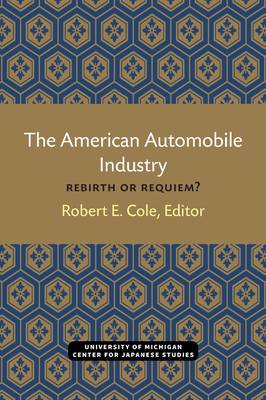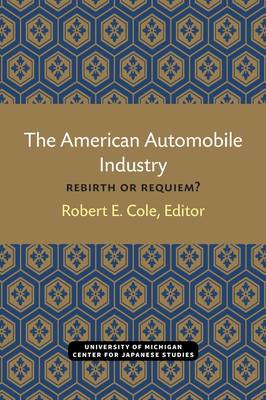
Bedankt voor het vertrouwen het afgelopen jaar! Om jou te bedanken bieden we GRATIS verzending (in België) aan op alles gedurende de hele maand januari.
- Afhalen na 1 uur in een winkel met voorraad
- In januari gratis thuislevering in België
- Ruim aanbod met 7 miljoen producten
Bedankt voor het vertrouwen het afgelopen jaar! Om jou te bedanken bieden we GRATIS verzending (in België) aan op alles gedurende de hele maand januari.
- Afhalen na 1 uur in een winkel met voorraad
- In januari gratis thuislevering in België
- Ruim aanbod met 7 miljoen producten
Zoeken
The American Automobile Industry
Rebirth or Requiem?
€ 16,95
+ 33 punten
Omschrijving
Amid the gloom, indeed the despair, that prevailed among auto industry spokesmen during early 1981, the University of Michigan held the first U.S.-Japan Auto Conference. With all the uncertainty that accompanies a march into new territory, the conference very much resembled a call to arms as industry, union, and government officials sought to comprehend and respond to the Japanese challenge. In the subsequent two conferences in 1982 and 1983, the concerned parties displayed an impressive willingness to roll up their sleeves and get on with creating the conditions for a renewal of the industry. Yet success seemed to elude their efforts, and frustrations mounted as the national recession lengthened and deepened. It was not until the March 1984 conference that definite change in tone became apparent. By this time, it was clear that the industry was beginning to reap the fruits of its efforts. As Paul McCracken notes in his remarks, the market for new cars was manifesting its traditional high-geared response to improved business conditions, and the voluntary trade restraints were contributing to the ability of the industry to take advantage of this renewed prosperity. In addition, those who know the industry well knew that the major improvements in quality and productivity had been made, and many of the changes responsible for these improvements seem unlikely to be reversed. All this was much on the minds of speakers and participants during the March conference. The various speakers presented an image of people who thought that they were pretty much on the way toward addressing successfully their internal problems of productivity, quality, and marketing. All that remained was to dispose of the external factors that prevented the, from competing on that well-known if elusive "level playing field." [ix]
Specificaties
Betrokkenen
- Uitgeverij:
Inhoud
- Aantal bladzijden:
- 112
- Taal:
- Engels
- Reeks:
- Reeksnummer:
- nr. 13
Eigenschappen
- Productcode (EAN):
- 9780939512218
- Verschijningsdatum:
- 1/01/1984
- Uitvoering:
- Paperback
- Formaat:
- Trade paperback (VS)
- Afmetingen:
- 152 mm x 229 mm
- Gewicht:
- 185 g

Alleen bij Standaard Boekhandel
+ 33 punten op je klantenkaart van Standaard Boekhandel
Beoordelingen
We publiceren alleen reviews die voldoen aan de voorwaarden voor reviews. Bekijk onze voorwaarden voor reviews.








